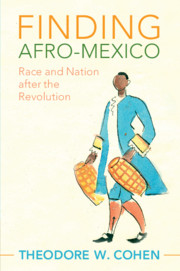Book contents
- Finding Afro-Mexico
- Afro-Latin America
- Finding Afro-Mexico
- Copyright page
- Dedication
- Contents
- Figures and Maps
- Acknowledgments
- Abbreviations
- Introduction
- Part I Making Blackness Mexican, 1810–1940s
- Part II Finding Afro-Mexico, 1940s–2015
- 4 Looking Back to Africa
- 5 Africanizing “La bamba”
- 6 Caribbean Blackness
- 7 The Black Body in Mexico
- Conclusion
- Bibliography
- Index
6 - Caribbean Blackness
from Part II - Finding Afro-Mexico, 1940s–2015
Published online by Cambridge University Press: 17 April 2020
- Finding Afro-Mexico
- Afro-Latin America
- Finding Afro-Mexico
- Copyright page
- Dedication
- Contents
- Figures and Maps
- Acknowledgments
- Abbreviations
- Introduction
- Part I Making Blackness Mexican, 1810–1940s
- Part II Finding Afro-Mexico, 1940s–2015
- 4 Looking Back to Africa
- 5 Africanizing “La bamba”
- 6 Caribbean Blackness
- 7 The Black Body in Mexico
- Conclusion
- Bibliography
- Index
Summary
Chapter 6 turns to popular culture, especially poetry written by the city of Veracruz’s official chronicler Francisco Rivera, to explore how little the elite constructions of blackness detailed in previous chapters permeated the public sphere in the 1950s, 1960s, and 1970s. Reading the same Cuban intellectuals who helped Baqueiro Foster and Katherine Dunham Africanize “La bamba,” Rivera adopted an Afro-Cuban vernacular to define the city of Veracruz’s musical and historical relationship to the African Diaspora. A symbol of the city’s identity, his verse articulates a collective cultural memory rooted in the history of public spaces: the city’s main square, streets, parks, and piers. It blackens the city’s identity while lamenting the declining popularity the Afro-Cuban musical genres, chiefly danzón, that had enlivened local culture in the nineteenth century and especially during the 1910 Revolution. In short, he argued that, to resuscitate Veracruz’s African-descended musical heritage, the national elite needed to celebrate its festive improvisation and polyvocality: two pillars of the political participation that epitomized the democratic yearnings of the 1910 Revolution. Without the danzón’s resurgence, postrevolutionary democracy would remain a farce, and the PRI would continue to rule without regard for the people it supposedly represented.
Keywords
- Type
- Chapter
- Information
- Finding Afro-MexicoRace and Nation after the Revolution, pp. 190 - 221Publisher: Cambridge University PressPrint publication year: 2020



